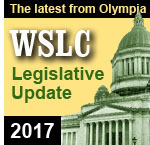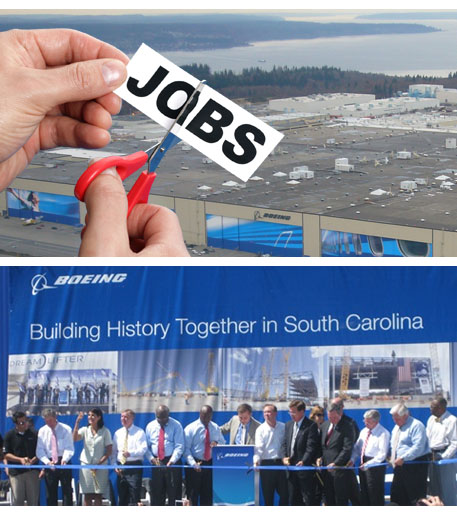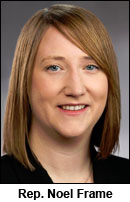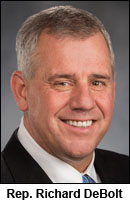STATE GOVERNMENT
Hold Boeing accountable for state tax breaks (WSLC Leg. Update)
New bills would protect Washington jobs as Boeing cuts continue

 OLYMPIA (March 13, 2017) — With support from organized labor, Washington’s Legislature has approved major tax incentives in recent years with the clearly expressed intent to maintain and grow the state’s aerospace workforce. Most recently in 2013, that’s what the Legislature and The Boeing Co. agreed to when the state extended an estimated $8.7 billion in incentives to the aerospace industry.
OLYMPIA (March 13, 2017) — With support from organized labor, Washington’s Legislature has approved major tax incentives in recent years with the clearly expressed intent to maintain and grow the state’s aerospace workforce. Most recently in 2013, that’s what the Legislature and The Boeing Co. agreed to when the state extended an estimated $8.7 billion in incentives to the aerospace industry.
However, instead of increasing employment in the state as our Legislature intended and the public expected, since that time Boeing has cut 12,259 jobs in Washington — almost 7,400 in the past year alone — with more cuts planned later this year. And yet the company continues to receive its full tax incentive.
 Many of these jobs are being deliberately moved to other states and overseas, including to South Carolina, Missouri and Alabama — states that require new jobs in order for Boeing to receive their tax breaks. Industry analysts are now predicting that Boeing will shift assembly for all 787 Dreamliners to South Carolina by the end of the decade. In 2003, Boeing agreed to assemble the 787 in Washington in order to receive the original multi-billion dollar aerospace tax incentives that were extended in 2013.
Many of these jobs are being deliberately moved to other states and overseas, including to South Carolina, Missouri and Alabama — states that require new jobs in order for Boeing to receive their tax breaks. Industry analysts are now predicting that Boeing will shift assembly for all 787 Dreamliners to South Carolina by the end of the decade. In 2003, Boeing agreed to assemble the 787 in Washington in order to receive the original multi-billion dollar aerospace tax incentives that were extended in 2013.
Two new bills introduced last week in the Legislature are a clear indication of concern — from both sides of the political aisle — that the Washington’s aerospace tax preferences are failing to achieve their intended purpose and need to be amended.
HB 2146, sponsored by Rep. Richard DeBolt (R-Chehalis), and HB 2145, sponsored by Rep. Noel Frame (D-Seattle), have support from dozens of members of their respective caucuses. Both titled the Aerospace Tax Incentive Accountability Act, the bills would amend the aerospace tax incentives — which have already been amended several times since they were enacted in 2013 — to add job conditions resembling those required in other states in order for Boeing to receive tax incentives.

 “Our unions agree with Representatives DeBolt and Frame that job accountability must be added to our state’s aerospace tax preferences,” reads a joint statement issued Friday by the two major unions representing Boeing and other aerospace workers in Washington: Machinists Union District Lodge 751 and the Society of Professional Engineering Employees in Aerospace/IFPTE 2001. “We applaud their work keeping this issue in the forefront and believe both bills provide an opportunity for the Legislature to protect Washington jobs and grow our state’s aerospace industry.”
“Our unions agree with Representatives DeBolt and Frame that job accountability must be added to our state’s aerospace tax preferences,” reads a joint statement issued Friday by the two major unions representing Boeing and other aerospace workers in Washington: Machinists Union District Lodge 751 and the Society of Professional Engineering Employees in Aerospace/IFPTE 2001. “We applaud their work keeping this issue in the forefront and believe both bills provide an opportunity for the Legislature to protect Washington jobs and grow our state’s aerospace industry.”
HB 2145 would reduce Boeing’s tax credit by half if the company’s employment in Washington drops below 70,000 jobs. The company gets no tax credit and pays the standard tax rate all other manufacturers pay if its employment drops below 67,500 jobs. Boeing currently employs 71,036 Washington workers, down from 83,295 in November 2013. Aerospace tax credits would remain in place if the job loss is due to a nationwide industry downturn.
HB 2146 would assess Boeing employment levels in 2024, the year the original aerospace tax incentive begins its extension. If Boeing’s average employment in Washington is less than 75,000 during the period of 2017-2024, the aerospace tax incentives would expire for all companies.
Although organized labor has concerns about some details, the Washington State Labor Council, AFL-CIO joins IAM 751 and SPEEA in strongly urging the House Finance Committee to consider these proposals and advance a solution that brings needed accountability to Washington’s aerospace tax preferences.
Today is ‘Keep Film in Washington’ Day
If you’re looking for an example of a model tax incentive that guarantees its recipients are accountable for creating jobs in the state, look no further than the Motion Picture Competitiveness Program. Filmmakers only receive its rebates after the production is completed and the jobs have been created. That’s a guaranteed return on the taxpayers’ investment. The program also encourages productions to maximize in-state spending because incentive funds are only allocated for expenditures made within the state.
 Today is “Keep Film in Washington” Day and hundreds of creative professionals from across the state will be at the State Capitol urging their legislators to renew the program. The day’s events will include a virtual and augmented reality demo as well a SIFF (Seattle International Film Festival)-curated screening of short films made in the state. Who knows? Some zombies could even show up, like they did in 2015.
Today is “Keep Film in Washington” Day and hundreds of creative professionals from across the state will be at the State Capitol urging their legislators to renew the program. The day’s events will include a virtual and augmented reality demo as well a SIFF (Seattle International Film Festival)-curated screening of short films made in the state. Who knows? Some zombies could even show up, like they did in 2015.
HB 1527 and SB 5502 , sponsored by Rep. Marcus Riccelli (D-Spokane) and Sen. Randi Becker (R-Eatonville), would reinstate a relatively small tax incentive — $3.5 million per calendar year for the next 10 years — to encourage filmmaking in our state and attract a wide range of associated jobs and economic investment. Over the past three years, projects approved for funding assistance have spent money in every single legislative district in the state. But if legislators fail to act, this incentive will expire on June 30. Download a fact sheet on the Motion Picture Competitiveness Program for more information.
Delegates representing unions from across the state approved a 2016 Washington State Labor Council resolution supporting this important tax incentive and its renewal.
The latest on working-family legislation
Check out the latest status report on key working family bills at The Stand. It is not a comprehensive list of the bills upon which the Washington State Labor Council has taken a position. These updates are on bills previously described in this newsletter and at The Stand.
Also, there’s much more news from the State Legislature posted each week at The Stand. This past week, it included:
 Join WSLC at March 14 hearing for Clean Energy Transition Act –The Clean Energy Transition Act (HB 1646), sponsored by Rep. Joe Fitzgibbon (D-Burien), will have a public hearing in the House Environment Committee on Tuesday, March 14 in Olympia. This bill represents an innovative, comprehensive climate solution based on the principles of the Alliance for Jobs and Clean Energy, investing in 21st century infrastructure and delivering economic and environmental justice to communities disproportionately impacted by poverty and pollution. In the process, the Evergreen State can become a global leader in cutting carbon equitably and effectively. Read more.
Join WSLC at March 14 hearing for Clean Energy Transition Act –The Clean Energy Transition Act (HB 1646), sponsored by Rep. Joe Fitzgibbon (D-Burien), will have a public hearing in the House Environment Committee on Tuesday, March 14 in Olympia. This bill represents an innovative, comprehensive climate solution based on the principles of the Alliance for Jobs and Clean Energy, investing in 21st century infrastructure and delivering economic and environmental justice to communities disproportionately impacted by poverty and pollution. In the process, the Evergreen State can become a global leader in cutting carbon equitably and effectively. Read more.
Transportation coalition decries Senate’s possible ST3 delays –On Monday, the Washington State Senate met to discuss measures that will delay the implementation of our region’s mass transit system, ignoring the will of the voters to expand and improve regional transportation options. The landmark voter approval of Sound Transit 3 last fall advanced the critical plans to expand light rail, commuter rail, and bus rapid transit connecting Tacoma, Everett, Seattle, Redmond, Bellevue, and Federal Way. Business and labor interests on the Transportation Choices Coalition decried Monday’s action by the Senate as a step backwards in addressing our region’s mobility needs. Read more.
Bill seeks prescription drug price transparency to manage costs –The true costs of prescription drugs are largely hidden, hard to understand, and nearly impossible to predict. That’s why prescription drug pricing transparency legislation has been proposed this year: to help lawmakers understand what is driving drug prices and address the root causes of rising healthcare costs. 2SHB 1541, sponsored by Rep. June Robinson (D-Everett) and 38 other state representatives, would improve regulation, transparency and accountability on prescription drug pricing. Read more.





